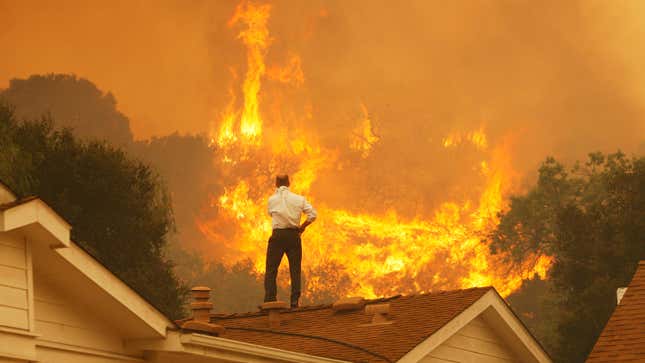
Remember that earth-shattering climate report from a couple years ago that said we have to massively cut emissions by 2030 to ensure we don’t exceed 1.5 degrees Celsius (2.7 degrees Fahrenheit) threshold of global warming above pre-industrial temperatures? Well, there’s a chance we’ll cross that benchmark a lot sooner than we thought.
The new outlook from the World Meteorological Organization found that average temperatures are likely to be at least 1.8 degrees Fahrenheit (1 degree Celsius) above preindustrial levels—a threshold we first crossed in 2015—each year from 2020 to 2024. It also says that there’s a 20% chance that one of the next five years on Earth will average 2.7 Fahrenheit, with the likelihood continuing to grow.
The forecast, which is based on models from climate prediction centers around the world, shows the urgent need for transformative global climate policy, especially if we still want to limit global warming below the 2 degrees Celsius (3.6 degrees Fahrenheit) goal outlined in the Paris Climate Agreement.
The 1.5 degrees Celsius threshold is also outlined in the Paris Agreement. Though crossing it for a single year doesn’t mean we couldn’t still meet that target, on average, it’s certainly not a good sign. Past studies show that the last decade was the warmest on record, and that last year was the second warmest year in recorded history, trailing only 2016.
“Irreversible climate breakdown is proceeding as scientists have long predicted,” Peter Kalmus, a climate scientist at NASA’s Jet Propulsion Laboratory speaking on his own behalf and who did not work on the analysis, told Earther in an email. “We are in the process of losing Earth as we used to know it.”
Those trends of ever-rising heat are likely to continue. The new report projects that over the next five years, nearly all regions of the Earth are likely to be warmer than they were in the recent past. Granted, it doesn’t factor in the reduction in global emissions that resulted from the covid-19 pandemic, but the dip seems to be short-lived anyway.
Some parts of the Earth will continue to warm more quickly than others. The Arctic, which in recent years has seen dramatic ice melt and is currently experiencing fires and a hellish heat wave, is forecast to keep heating up twice as fast as the global average. Warming in the Arctic could thaw permafrost, melt ice, and unleash major storms that pose a huge risk to communities.
Crossing the 1.5 degree Celsius average threshold permanently would usher in catastrophic storms, droughts, and heat waves. It would threaten access to food and water and could create the conditions for more war and economic instability. And of course, poor people, especially in the Global South, will suffer the worst consequences. Put simply, this is a fucking emergency.
Reaching the point where this is even a risk wasn’t inevitable, it was the result of a refusal on the part of civic leaders to take action despite endless warnings from climate scientists. As Bloomberg’s Eric Roston wrote this week, “coal, oil and gas don’t burn themselves. Their continued use is the result of active decision-making, carried out by inertia-bound institutions whose hold on power depends on maintaining the unsustainable status quo.”
That also means it’s not too late to change course. World leaders could still choose to put a global Green New Deal into action, halting fossil fuel production, drawing down emissions from every sector of the economy, and doing everything they can to ensure communities—especially the most vulnerable among us—can adapt to the changing climate. That won’t be easy, but inaction would be catastrophic.